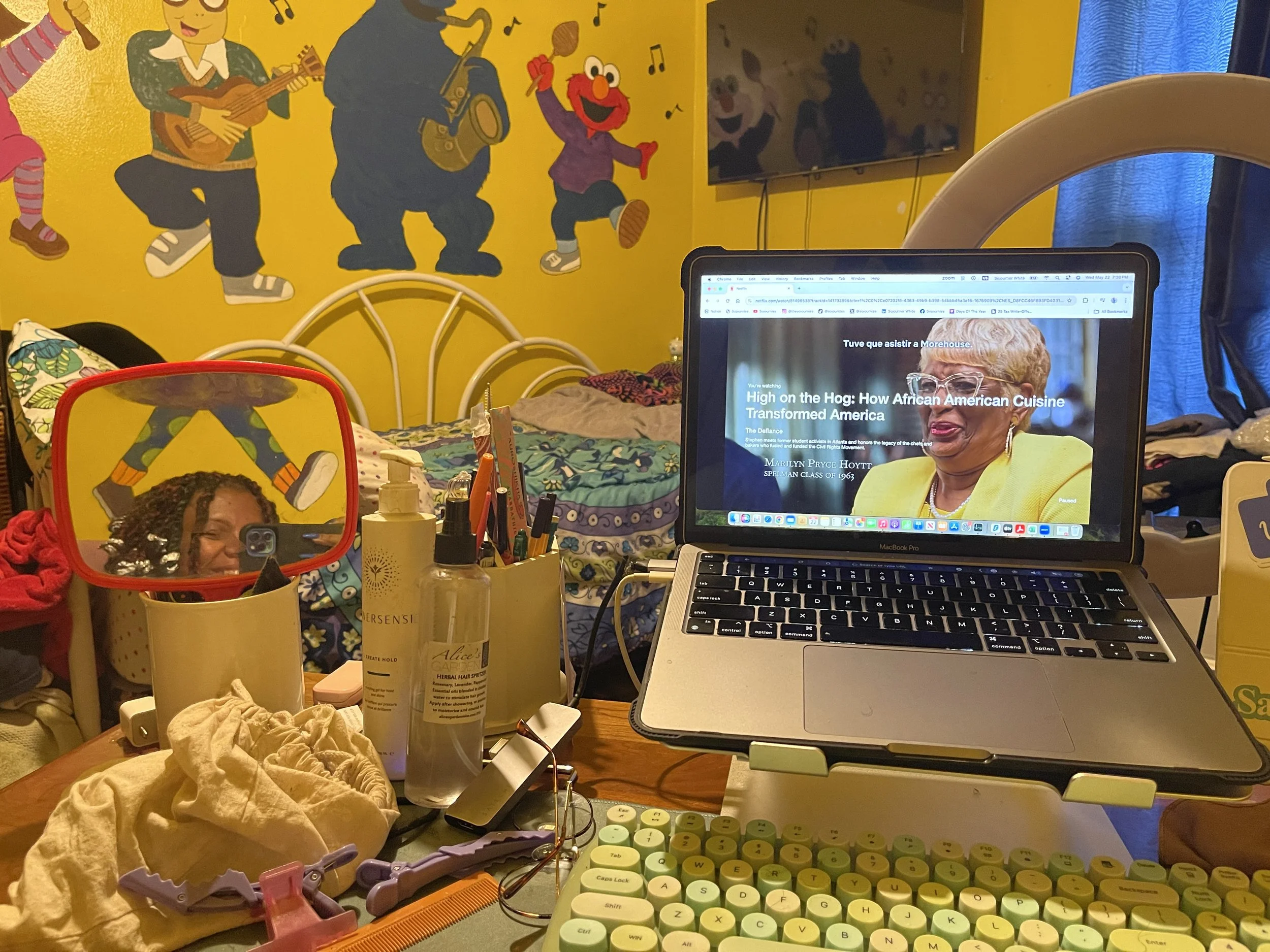Hair Day Reflections: Am I My Ancestor’s Wildest Dreams?
Photo: Sojourner in her room doing her hair and watching Netflix
Rising before the sun on a cool Spring day, I awakened wanting to be inspired. I woke up early before work because I had to retwist my hair, but of course I needed something good to watch. So naturally, I gravitated to travel media. Outside of working at UBUNTU, I love learning through travel. And on those mornings when I cannot physically transport myself somewhere else, I look to YouTube. I sit at my desk, in my yellow room, in my purple chair, with all my hair products next to me, mirror to the side, ready to follow a vlogger’s girl’s trip through Cape Town or a solo trip to Puglia, Italy. But this morning, I instead gravitated to Netflix by watching season two of High on the Hog: How African American Cuisine Transformed America.
If you have never watched it before, High on the Hog honors how Black Americans have shaped food culture in the United States. The host, Stephen Statterfield, travels to various U.S. cities to learn more about the history of Black Americans. The documentary unpacks how we brought food from our African roots through the Great Migration and beyond. As a Black American, anytime our history and food are showcased in the media, I must watch. I always learn something new or find a rabbit hole of Black history to research later.
Photo: An unnamed Pullman porter works at Chicago's Union Station in 1943. Jack Delano/Library of Congress.
However, the rabbit hole wasn't Google searches, it was in me. At the end of the first episode, Stephen travels to Chicago to learn about the Pullman Porters. These Black men worked on trains owned by George Pullman post-Civil War. While the Pullman Porters are credited for building the Black middle class, they also faced a lot of discrimination and racism from the wealthy white passengers they served. Pullman Porters were never called by their real names, only by the company's owner, George. The men Stephen interviewed on High on the Hog spoke at length about how undignified the experience of being a porter could be. Their experiences later led to the first Black labor union in the U.S. called the Brotherhood of the Sleeping Car Porters.
The second episode built upon the experiences of Black Americans, though this time during the civil rights movement in Atlanta. Stephen interviewed students who were a part of the 1960 sit-ins and marches to integrate food counters. These students were young at the time, with many of them only in their late teens. They described how inhumane it felt to have to eat from the back of an establishment or not be welcomed at all. They also described how scary it was to go up against the Ku Klux Klan (KKK). Dr. Georgianne Thomas recounted being burned on the wrist with a cigarette and spit on by a KKK member. Marilyn Pryce Hoytt told the story of being arrested and imprisoned for protesting. Their movement building and courage led to the Civil Rights Act of 1964, which prohibits discrimination based on race, color, religion, sex, or national origin.
Photo: Tweet screenshot from philip lewis on X (formerly Twitter)
Watching both of these episodes, I was reminded of a shirt I saw emerge across social media some years ago that read; I am my ancestors' wildest dreams. I remember that phrase becoming a viral tweet every other month or so. And I also remember it being used when describing Black Excellence when Black students graduate from college. I used it when I graduated with my Bachelors of Arts in Psychology and Spanish and my Master of International Social Work. This phrase of pride was linked to achievement and advancement for some of us within the Black community.
But now, as an evaluator, I have to ask…to what extent are we, am I, truly my ancestors' wildest dreams? I do not knock my personal and professional achievements, mainly due to the community of people who have believed in, invested in, and supported me. I can't help but think how complicit I have also been in the systems my ancestors were fighting to integrate. I haven’t started a union or influenced policy. And though I love to travel, I don’t think believing the myth that “travel is revolutionary” is what Gil Scott-Heron meant when he said, “The revolution will not be televised.”
Though a lot has changed since the Pullman Porters and Civil Rights Movement, a lot has also been rebranded to make Black folks more complicit and comfortable in white supremacy. Fighting for representation politics led to Black faces in high places engaging in the same anti-Blackness that burned the wrist of Dr. Thomas by the KKK. It led to Black deans at higher education institutions who were scapegoats for those universities’ institutional racism. It led to Black women creating businesses to be DEI leaders and breaking into tech, only to be saddled with unpaid emotional labor and the first ones laid off in “restructurings.” It led to the emergence of passport bros - Black men engaging in sex tourism and exploitation of “traditional” women in Asian and Latin American countries to make their wives because they are more submissive than Black women. It smells like colonization to me and how white enslavers raped and abused their Black slaves.
Photo: Sojourner on a safari in Kenya
As Audre Lorde says, the master’s tools will not dismantle the master’s house (Lorde, 1984). While it’s easy to point the finger at others, watching High on the Hog caused me to self-reflect. Being an evaluator at UBUNTU, where we specialize in storytelling evaluation and the importance of asking questions, I would be remiss if I didn't share the ones brewing in my mind now that may also resonate with you.
⦁ What am I doing with my privileges due to my ancestors' sacrifices?
⦁ How am I sharing the knowledge of my travels in a way that preserves the stories and histories of the places I've been and the people I've met - not exploit them?
⦁ How am I using my role as an evaluator at UBUNTU to design a future where the generations to come will not be burdened by racism?
⦁ If I am not my ancestors' wildest dreams, am I the dream of white supremacy?
As High on the Hog points out, everyone in the community, from chefs to barbers, has a role in a revolution as we move toward liberation. But I have no answers to these questions. They are not simple and will evolve as I continue to grow and learn. Media such as High in the Hog and places such as UBUNTU are two knowledge resources for me to continue to unpack what it means to be my ancestors’ wildest dreams. They are also a reminder that sometimes your hair day can show you something deeper in your reflection.




